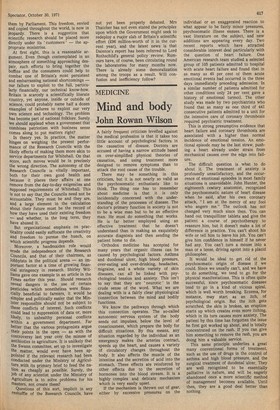Mind and body
John Rowan Wilson
A fairly frequent criticism levelled against the medical profession is that it takes too little account of psychological factors in the causation of disease. Doctors are accused of having a narrow attitude based on over-simplified physical theories of causation, and using treatment more designed to remove symptoms than to attack the root cause of the trouble.
There may be something in this criticism, but it is not nearly so valid as the psychosomatic enthusiasts like to think. The thing one has to remember about medicine is that it is only incidentally concerned with the understanding of the processes of disease. The doctor's primary function in society is not to be a wise man but to be an effective man. He must do something that works. He is far better employed using an effective treatment that he doesn't understand than in making an exquisitely accurate diagnosis and then sending the patient home to die.
Orthodox medicine has accepted for many years that organic illness can be caused by psychological factors. Asthma and duodenal ulcer, high blood pressure, over-eating and over-drinking, headaches, migraine, and a whole variety of skin diseases, can all be linked with psychological tension and anxiety. This isn't to say that they are ' neurotic' in the crude sense of the word. What we are dealing with is a fairly clear physiological connection between the mind and bodily functions.
We know the pathways through which this connection operates. The so-called autonomic nervous system of the body sends out impulses, below the level of consciousness, which prepare the body for difficult situations. By this means, any situation regarded by the individual as an emergency makes the arteries contract, speeds up the heart, and causes a variety of circulatory changes throughout the body. It also affects the muscle of the intestine and the secretion of acid into the stomach. These effects are reinforced by other effects due to the secretion of hormones into the blood stream. It is a highly complex and delicate mechanism which is very easily upset.
If the mechanism is thrown out of gear, either by excessive pressures on the individual or an exaggerated reaction to what appear to be fairly minor pressures, psychosomatic illness ensues. There is a vast literature on the subject, and new additions are appearing every day. Two recent reports which have attracted considerable interest deal particularly with the question of heart failure. One American research team studied a selected group of 105 patients admitted to hospital with acute heart failure and found that in as many as 49 per cent of them acute emotional events had occurred in the three days immediately preceding admission. In a similar number of patients admitted for other conditions only 24 per cent gave a history of emotional turmoil. The other study was made by two psychiatrists who found that as many as one third of 441 consecutive patients admitted to a unit for the intensive care of coronary thrombosis required psychiatric treatment.
This is strong presumptive evidence that heart failure and coronary thrombosis are associated with a higher than normal incidence of emotional tension. An emotional episode may be the last straw, push ing a heart already under strain from mechanical causes over the edge into failure.
The difficult question is what to do about it. The treatment of anxiety is profoundly unsatisfactory, and the occur rence of emotional episodes in most family situations is unavoidable. John Hunter, the eighteenth century anatomist, recognized the psychosomatic nature of heart disease when he said, after his own coronary attack, "I am at the mercy of any fool who angers me." The outlook has not changed very much since then. You can hand out tranquillizer tablets and give the patient a course of psychotherapy to reassure him, but it doesn't make a lot of difference in practice. You can't shoot his wife or tell him to leave his job. You can't give him confidence in himself if he never had any. You can't turn a mouse into a man or a tense, driving egoist into a placid philosopher.
It would be ideal to get rid of the psychosomatic origin of disease if we could. Since we usually can't, and we have to do something, we tend to go for the physical manifestations. This is often quite successful, since psychosomatic diseases tend to go in a kind of vicious spiral, which is well worth breaking. Eczema, for instance, may start as an itch, of psychological origin. But the itch gets scratched, the skin is broken, an eruption starts up which creates even more itching, which in its turn causes more anxiety. The patient by this time has forgotten the issue he first got worked up about, and is totally concentrated on the rash. If you can give him something to remove the rash, you are doing him a valuable service. This same principle underlies a great many conventional forms of treatment, such as the use of drugs in the control of asthma and high blood pressure, and the surgical treatment of duodenal ulcer. They are well recognized to be essentially palliative in nature, and will be eagerly abandoned once a more scientific method of management becomes available. Until then, they are a good deal better than nothing.


































 Previous page
Previous page